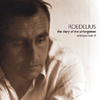 The sixth album in his Selbstportrait series, this is one of the best. Hans-Joachim Roedelius created this mini-masterpiece during the mid '70s, drawing on various recordings from his career at that time and building on them with added instrumentation and a wider selection of tones, structures and styles. The end result is a dazzling mix of old and new material (well it is all old at this stage considering the age of the album) which gives Roedelius’ talent the spotlight it deserves.
The sixth album in his Selbstportrait series, this is one of the best. Hans-Joachim Roedelius created this mini-masterpiece during the mid '70s, drawing on various recordings from his career at that time and building on them with added instrumentation and a wider selection of tones, structures and styles. The end result is a dazzling mix of old and new material (well it is all old at this stage considering the age of the album) which gives Roedelius’ talent the spotlight it deserves.
While not a break from the dreamy textures of his more famous works with Cluster and Harmonia (not surprising considering he recycles a lot of studio debris from various album sessions), the pieces that make up The Diary of the Unforgotten show a more intimate side to Roedelius’ musical personality. The rolling rhythms of "Frohgemut" conjure up images of a babbling brook where the water has been replaced with a rainbow; the playful side of Roedelius’ work that peeps through the starker aspects of his music in evidence here. In contrast, the almost classical piano of "Du," which immediately follows "Frohgemut," has more in common with Popol Vuh or even Debussy. The beautiful piano playing is stark naked in comparison to the synthesizers that populate the rest of The Diary of the Unforgotten.
A large proportion of The Diary of the Unforgotten is given over to "Hommage à Forst," a labyrinthine exploration of beats and rhythms that should be instantly recognizable to any student of Krautrock. Many of these backing tracks are taken directly from Cluster and Harmonia pieces and it is hard not to start humming or singing the absent but familiar melodies. Roedelius uses these backing tracks as a springboard for some studio jamming, even bringing in the most unusual instrument of all (for him): an electric guitar. A wobbly echo effect transmutates the loose guitar playing into a strange, organic counterpart to the mechanical rhythms.
The Diary of the Unforgotten is certainly one of Roedelius’ finer solo releases. It is Roedelius’ experiments with his approach to composing and playing around these familiar elements which make the album and the bits lifted from Cluster and Harmonia songs are the least exciting parts here. The idea of this being an audio self-portrait is most apt as Roedelius’ character shines through with a brilliance that is almost blinding.
samples:
 
Read More


